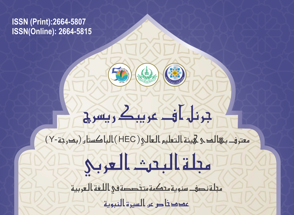اُردو مرثیہ پر عربی اثرات(انیس و دبیر کے خصوصی حوالہ سے) ARABIC INFLUENCES ON URDU MARSIYA (WITH SPECIAL REFERENCE TO ANEES AND DABEER) Section Articles
##plugins.themes.academic_pro.article.main##
Abstract
The tradition of elegiac poetry (marsiya) has deep roots in Arabic literature, where it primarily served as a medium for expressing grief and commemorating the valor of fallen warriors. In pre-Islamic Arabia, women often lamented the loss of brave tribal members, and poets composed verses to honor the deceased. This tradition transitioned into Islamic literature, where the martyrdom of Imam Hussain (AS) at Karbala became a central theme.The Urdu marsiya, particularly in the works of Mir Anees and Mirza Dabeer, exhibits significant Arabic influences in its structure, themes, and linguistic elements. Arabic rijs (war poetry) and Quranic verses are frequently woven into their compositions, enhancing both the rhetorical depth and religious significance of their poetry. Their marsiyas integrate Arabic vocabulary, idioms, and literary devices, reflecting the grandeur of Arabic poetry while maintaining a uniquely South Asian expression.This study explores how Anees and Dabeer adapted Arabic poetic conventions, incorporating Quranic allusions, Hadith references, and classical Arabic imagery to elevate the Urdu marsiya. Their works transformed marsiya from a simple elegy into a sophisticated literary form, preserving its emotional intensity while enriching Urdu literature with Arabic stylistic elements.

